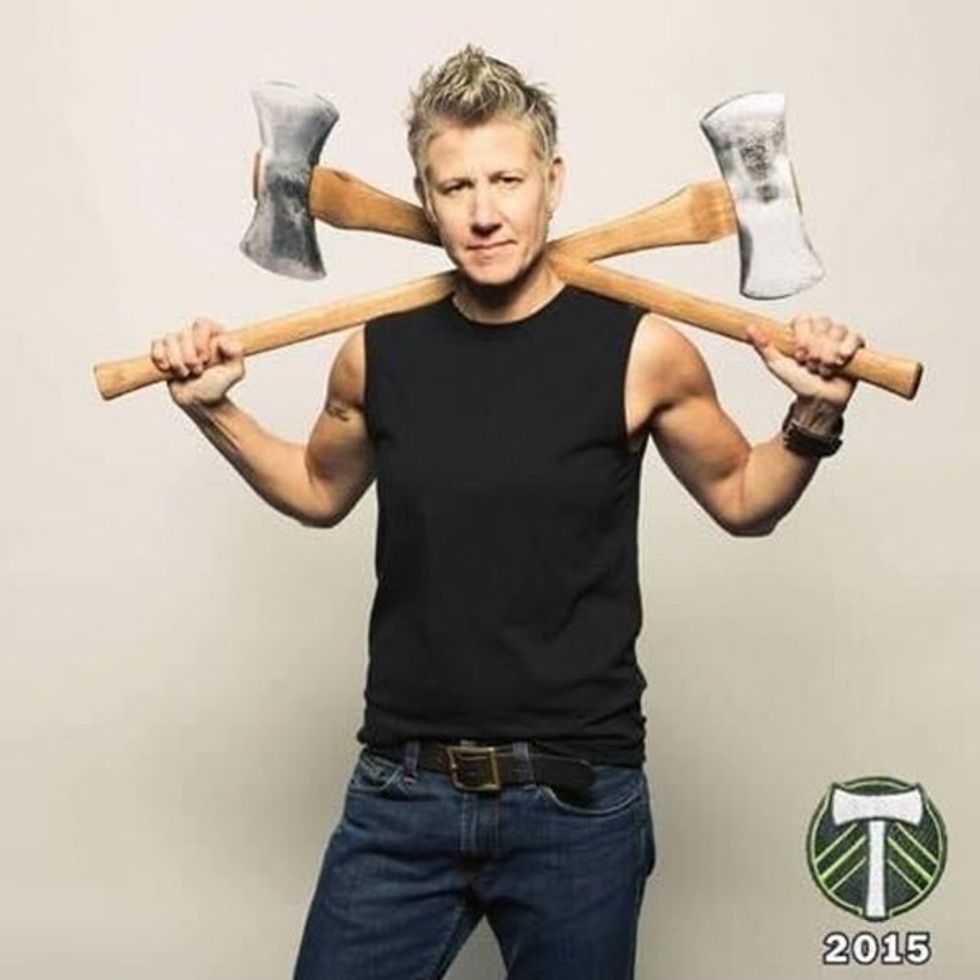In 2015, I had the honor of being on a billboard for the Portland Timbers FC. If you're not from the area, you should understand that we are football fanatics, so anyone having the chance to be on a billboard representing our team is a big deal.
Keep up with the latest in LGBTQ+ news and politics. Sign up for The Advocate's email newsletter.
The weeklong process of being on the billboard was stressful as all Oregonians had a chance to vote. So, for days, I watched the daily voter tallies, constantly comparing myself and getting overly anxious as if I was vying for some dream job. The following Saturday, I received the call letting me know I'd won by a landslide. One might think, wow, that's pretty cool but not noteworthy. What made this monumental is I am a masculine-presenting "butch" lesbian.
I spent a good portion of my childhood and young adult life closeted. Having to live daily hiding who you are isn't only lonely but cruel. It's one of the worst things anyone can experience as you're constantly pretending to be someone you're not, wholly isolated and invisible as an LGBTQ+ person. As a now fully self-aware lesbian, I'm here to tell you the importance of being out, proud, and visible.
The billboard went up in a high-traffic area in Northeast Portland. I couldn't stop smiling and crying when I saw it in person. I was 47 years old at that time and spent years living in a homophobic world filled with prejudice and discrimination against LGBTQ+ people. I had always felt like an outsider, being stared at like some abnormal freak - misgendered always - and occasionally even called derogatory names. All of this was because I was different. Yet there I was on a 30-foot-tall billboard, a butch lesbian holding two axes, representing the Portland Timbers FC. I felt like righteously proclaiming, "That's right! I'm here, I'm queer and not going anywhere!"
 Courtesy Shaley Howard
Courtesy Shaley Howard
The Timber FC is part of the American professional men's soccer club and has clear visibility, not to mention the enormity and fame of the Timbers Army. They certainly did not need my help with promotion. So, for a mainstream football club to have, and even encourage, putting someone like me on their billboard was a watershed moment. I'm not even close to the usual person any male sports club would want to represent them. And yet, the people of Oregon and the Timber FC did just that. I became part of their campaign.
Not long after the billboard went up, I received an email from a woman asking if I could meet with her young daughter. She'd seen the Timbers billboard and was blown away, not because of the muscly image but because I was like her. Like so many kids in this community, her world consisted almost entirely of heteronormative messages and pictures. A larger-than-life butch on a billboard was not the norm. After meeting her and seeing how thrilled she seemed to be talking to a 'real-life' lesbian, I was reminded how vital visibility is, especially to LGBTQ+ youth. To show them they are not alone.
It's been almost ten years since that iconic billboard went up. I am still incredibly proud and love my Timbers FC. However, talking with a friend the other day, I mentioned how hard it is years after the billboard went up. People still gush over that image and often post it as if it happened yesterday. "I truly loved the experience and was incredibly honored," I said, "but it happened so long ago." Nowadays, when I look in the mirror, a slightly different image greets me; still muscly in places, but a lot more sag is happening. My friend quietly responded, "It's not about you."
Of course, my ego internally exploded momentarily, thinking, "Of course, it's about me! It's my image!" But then it hit me: She was right. It had never been about me. It was about welcoming everyone. It was about acceptance, tolerance, and inclusivity—things I'd always longed for.
If that eureka moment wasn't enough, literally the next day after my conversation, I received a message from a woman I didn't know. Years ago, she told me, when moving across the country to Portland, she'd felt lonely, insecure, and unsure if she was making the right decision. But when she saw that Timbers FC billboard, she said, "I knew I was home." Any city proudly displaying a 30-foot billboard of a butch lesbian was a city she knew she would find acceptance not only from the LGBTQ+ community but the straight community too.
That's the importance of being visible and seen. That highly visible, 30-ft billboard I proudly stood by years earlier was also a beacon of inclusivity, love, and pride.
Shaley Howard is the author of Excuse Me, Sir! Memoir of a Butch.
Views expressed in The Advocate’s opinion articles are those of the writers and do not necessarily represent the views of The Advocate or our parent company, equalpride.
Have an inspiring personal story to tell? Want to share an opinion on an issue? Learn more by visiting advocate.com/submit.


 Courtesy Shaley Howard
Courtesy Shaley Howard

































































Charlie Kirk DID say stoning gay people was the 'perfect law' — and these other heinous quotes